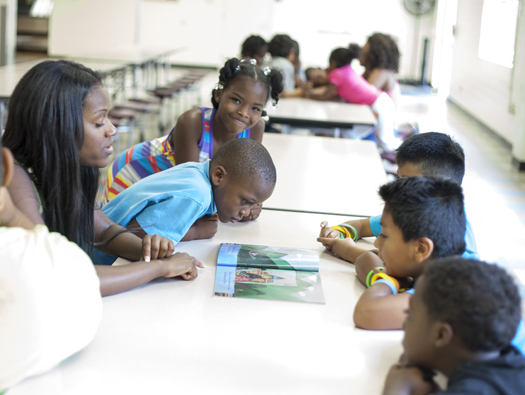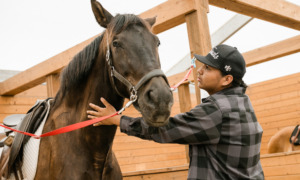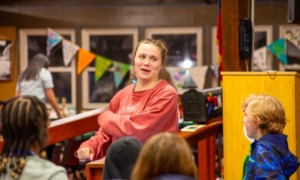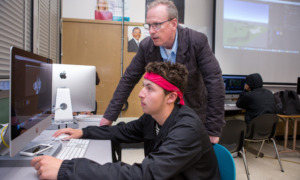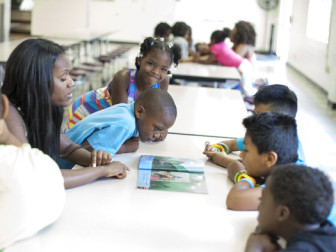
Freedom School Partners
Freedom School Partners is a six-week summer literacy program in Charlotte, N.C., modeled on the Freedom Schools created in Mississippi in the summer of 1964. Photo courtesy of Freedom School Partners.
Fifty summers ago, college students flocked to Mississippi to teach in Freedom Schools and take part in the Summer of Freedom. They were part of the civil rights movement’s effort to register voters and educate young people.
Today, the concept lives on in summer literacy programs sponsored by the Children’s Defense Fund — particularly at its largest site in Charlotte, N.C.
Freedom School Partners in Charlotte is one of three summer programs in the nation that received the New York Life Excellence in Summer Learning Award in 2013.
Executive Director Mary Nell McPherson credits the program’s culture of learning and believing in children.
Freedom School Partners is a six-week K-8 reading program at 20 sites in Charlotte. It uses college students as teachers and starts every day with rituals that recall the civil rights movement.
It works on building character and helping children find their own strengths. “We help children realize they have the power in their own lives to make a difference,” said Freedom School Partners Program Director Macie Stewart.
 The model was developed by the Children’s Defense Fund in 1995 and has expanded into 29 states. More than 12,600 children took part across the country last summer, said Children’s Defense Fund spokesperson Raymonde Charles.
The model was developed by the Children’s Defense Fund in 1995 and has expanded into 29 states. More than 12,600 children took part across the country last summer, said Children’s Defense Fund spokesperson Raymonde Charles.
Last Thursday, Marian Wright Edelman, founder and president of Children’s Defense Fund, announced two new sites in Nashville, Tenn.
Children in the program read books that are culturally relevant to them — a practice all the more effective because it’s not necessarily part of their school experience.
“Our children are not used to seeing children’s books with pictures that look like them,” Stewart said.
Recent figures back up her statement.
The Cooperative Children’s Book Center at the University of Wisconsin surveyed 3,200 children’s books published in 2013 and found that only 93 were about African-Americans. It found 34 about American Indians, 69 about Asian-Pacific Americans and 57 about Latinos.
The impact of seeing oneself represented in books is great, Stewart said. When African-American and other minority children read about characters like themselves, “the stories resonate with them,” she said.
At Freedom School Partners, children do activities that relate to the stories they read. Younger kids might do art projects.
“Middle-schoolers might create a rap … whatever it takes to help that book come alive,” Stewart said.
“We work hard to get kids excited about reading,” she said.
The national program has a list of 80 books for use in Freedom Schools this summer, and the children keep the books.
In Freedom Schools across the country, the theme is the same: “I can make a difference.”
The first week, children learn about making a difference within themselves. In the second week, the focus is on making a difference within the family. In following weeks, the focus is on the community, the country, and finally, the world. Books tell the story of people like themselves who have made a difference in each area.
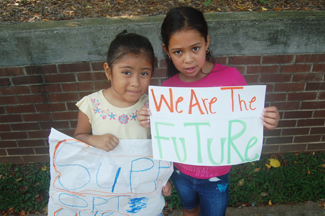 The kids start each day with Harambee, which is sometimes described as a motivational pep rally.
The kids start each day with Harambee, which is sometimes described as a motivational pep rally.
“It’s a very intentional and researched part of the model,” McPherson said. The name comes from a Swahili word meaning “let’s pull together.”
Children cheer and chant. “and clap and jump and holler,” McPherson said. They sing the song “Something Inside so Strong.”
“We’re all on the same page believing in ourselves,” she said.
College students serve as models for the children. Each one leads a group of 10 or fewer children for the six-week period, allowing them to build a relationship.
Children can identify with them, Stewart said: “‘You go to college? I can, too,’ the children think.”
To emphasize their service, the college students are called servant leaders. They are meant “to lead out of their hearts to help others grow to their full potential,” McPherson said.
The program is also set up to foster relationship with parents and with the community.
Instead of paying tuition — the program is free —parents are asked to give nine “engagement hours.” They may attend parent workshops, which are informational meetings on topics such as bullying, or they may engage in other ways. Some go on field trips with the kids. Others provide services, such as taking a pile of camp T-shirts home to wash.
The program’s relationship to the community is also built in. Each site is sponsored by and funded by a community partner, usually a church or synagogue. The University of North Carolina at Charlotte also sponsors a site. The site may be in the partner’s building or it may be in a school that the partner has an ongoing relationship with.
The partner organization also sends volunteers to do activities with the children, ranging from teaching kids to play chess to taking them on field trips to pick vegetables at a family farm. The involvement of additional adults “helps children believe in themselves all the more,” McPherson said.
Freedom School Partners in Charlotte runs from 8 a.m. to 3 p.m. on weekdays. It offers free transportation and provides breakfast, lunch and a snack.
A 2010 program evaluation by researchers at the University of North Carolina at Charlotte concluded that the majority of children improved or maintained their ability to read as measured by the Basic Reading Inventory.
Their report concluded the program could be a powerful tool for addressing summer learning loss.
Freedom School Partners was also evaluated using the National Summer Learning Association’s Comprehensive Assessment of Summer Programs.
The Mississippi Freedom Schools that serve as the model were part of the Freedom Summer of 1964, a huge voter registration drive that brought an influx of civil rights workers into Mississippi.
More than 40 Freedom Schools were set up in the state. They offered education to adults as well as to African-American kids who attended the underfunded and segregated schools in Mississippi. Freedom Schools aimed to foster active participation in civic life, from which African-Americans long had been excluded.
Financial supporters of Youth Today may be quoted or mentioned in our stories. They may also be the subjects of our stories.


